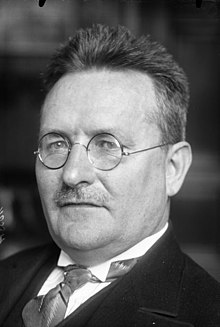Paul Löbe
| Paul Löbe | |
|---|---|

Löbe in 1924
|
|
| President of the Reichstag | |
|
In office 25 June 1920 – 28 May 1924 7 January 1925 – 30 August 1932 |
|
| President |
Friedrich Ebert Paul von Hindenburg |
| Chancellor |
Hans Luther Wilhelm Marx Hermann Müller Heinrich Brüning |
| Succeeded by | Hermann Göring |
| Personal details | |
| Born |
14 December 1875 Liegnitz, Prussia, German Empire |
| Died | 3 August 1967 (aged 91) Bonn, West Germany |
| Political party | Social Democratic Party of Germany (SPD) |
Paul Löbe (14 December 1875 – 3 August 1967) was a German politician and member of the Social Democratic Party of Germany (SPD), who served as President of the Reichstag.
Löbe was born in Liegnitz (present-day Legnica) in the Prussian province of Silesia. The son of a carpenter, he had to work as a waiting-boy helping to support the family. Finishing school he was trained as a typesetter at a printing shop in Breslau (Wrocław) and after his journeyman years worked in Dessau, Anhalt and Thuringian Ilmenau.
To support his mother, he returned to Silesia in 1898, taking up a job at the Breslau newspaper. Shortly afterwards he was appointed editor-in-chief, a post he held until 1920. His journalistic work often landed him in prison, for instance, when he called on readers to come to a demonstration to protest against the Prussian three-class franchise. In 1901 he married Clara Schaller. Löbe was dispensed from conscription in the German Army and did not serve in World War I on account of an illness in his lungs.
During the Nazi years, Löbe worked at the Walter de Gruyter academic publishing house. In the end of World War II Löbe found himself in Glatz (Kłodzko), from where he was expelled according to the resolutions of the Potsdam Agreement. He joined the staff of the daily newspaper Das Volk, and later became co-publisher of the Telegraf in Berlin. He died in West Germany's capital, Bonn and is buried in an Ehrengrab at the Berlin-Zehlendorf cemetery.
...
Wikipedia
